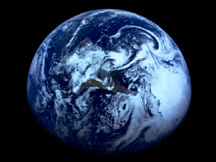 No Room for God in a Universe Teeming With Life
No Room for God in a Universe Teeming With Life
April 16, 1999
by James Still
A spate of recent astronomical discoveries has led to the conclusion that our solar system is not unique in the universe. We're now finding, as physicist and theorist Carl Sagan predicted twenty years ago, that there are planets in orbit about other stars. San Francisco State astronomers Geoffrey Marcy and Paul Butler alone have discovered twelve planets outside of our solar system. It seems that planet formation is not as improbable as it was once thought.
Luis Rodriguez of the National University of Mexico used the Very Large Array (VLA) of the National Radio Astronomy Laboratory in New Mexico to study a double-star system 450 light years away in the constellation Taurus. He reported his results in the September 1998 journal Nature. Rodriguez detected that each star was encircled by a thick ring of cosmic dust and gas, exactly the sort of matter that coalesces to form planets. The rings contained enough matter to form two such Jupiter-sized planets. Researchers at the Extrasolar Research Corp. in Pasadena, California, looking in the same constellation, now have what they think is the first photograph of a planet using Hubble's new near-infrared camera. The planet, about twice the size of Jupiter, has been provisionally called "TMR-1C."
As early as 1996, Marcy and Butler had strongly suspected that a planet raced around Upsilon Andromedae once every 4.6 Earth days at a distance of 5.5 million miles away from the star. On April 15 of this year, a team of researchers confirmed the remarkable discovery that the star, a mere 44 light years away, had two additional Jupiter-sized planets in orbit about it, bringing to 18 the total number of planets outside of our solar system. Astronomers are able to detect the presence of planets by measuring the wobbles of a star caused by the tiny gravitational tug of the orbiting body. Measurements built up since the mid-1990s from Hubble and radio telescopes, show with a remarkable degree of accuracy the force being exerted on a given star by orbiting planets. By looking at these measurements to see where the force is coming from and how much wobble is present in the star, researchers are able to determine how much mass and the position of the planet or planets in orbit about it.
Scientists working on the problem predict that within the next decade we will be able to confirm the existence of Earth-sized planets capable of supporting life. Most already think that life-supporting planets exist, but to observe their existence will finally lay to rest any lingering doubt. If there are hundreds of thousands, probably millions, of potentially life-supporting planets in the universe, then it is likely that the universe is teeming with life. This raises certain philosophical and theological questions. Are there other rational beings in the universe like ourselves? If life arises quite easily given the proper conditions, as biologists are now beginning to suspect, what need is there for special creation? Is humanity particularly privileged at the center of the cosmos given the existence of other life forms across the expanses?
It seems that the existence of other planets, and intelligent life on those planets, renders the Christian dogma of redemption and salvation by Christ very problematic. Unless we make the ad hoc suggestion that Christ jumped from planet to planet, dying and rising perhaps a million times, in order to pay the blood sacrifice necessary for salvation on each world, the salvific significance of the crucifixion is incoherent. One could argue that Christ died only once, here on Earth, and that this single outpouring of his grace was enough to effect salvation on other worlds as well. But this seems very unintuitive. This would be like an unknown god on an unknown world millions of light years from Earth doing something that has causal efficacy for us humans even though we never learn of it. And as has been said in another context, a something about which nothing can be said is really nothing whatever. Christ's death on this world would mean nothing whatever to a different life-form millions of light years from Earth.
The worldview of metaphysical naturalism is a far better explanation than theism for the fact that the universe contains billions of planets, hundreds of thousands or even millions of which probably support intelligent life. When the conditions are right, given enough warmth, nutrition, and water, life arises quite easily on its own. As we learn more about the existence of other planets, and possibly life on those planets, our quaint notions of Creation along with our hubris of thinking of ourselves as being the center of the universe, will become abandoned to the history of superstition. As Sagan remarked, "what room then for a Creator?"
Related Resources
Past Features
Click here for an index of past features.



